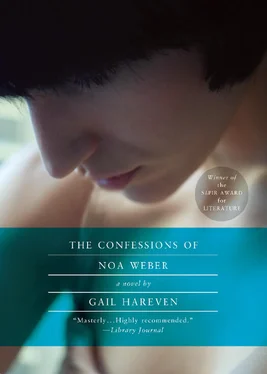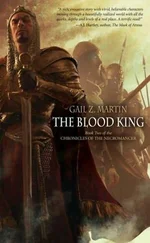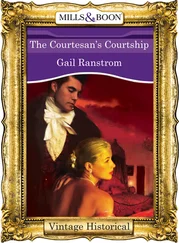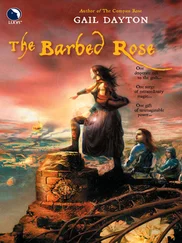Gail Hareven
The Confessions of Noa Weber
A CALM DISTANCE, A PANORAMIC VIEW
The city of J lies at the top of the hills of J. That’s how I’d like to begin my story; at a calm distance, with a deep breath, in a panoramic shot focusing very slowly on a single street, and very slowly on a single house, “this is the house where I was born.” But you’d be making a fool of yourself if your J were Jerusalem, since every idiot knows about Jerusalem. And altogether it’s impossible to talk about Jerusalem any more. Impossible, that is to say, without “winding alleys” and “stone courtyards,” “caper bushes” and “Arab women in the market place.” And I have nothing to say about caper bushes and stone courtyards, nor do I have the faintest desire to flavor my story with the colorful patois of colorful Jerusalem characters, twirling their mustaches as they spin Oriental tales.
Nor do I intend to mention here the hills of J, in other words the Judean Hills. These hills always depressed me with their thick history and the thin trunks of their pine trees, and the picnic leftovers scattered over the dry pine needles. And anyone who didn’t spread out a picnic blanket and open a picnic basket surely trailed behind their scoutmasters there in the footsteps of Judah Maccabee and Uri Ben-Ari and the continuing saga of Jewish heroism, which I somehow managed to forget, however hard they drilled it into my head.
Of all the things that preoccupy my thoughts, not a single one happened to me between the thorny burnet and the arbutus tree, and so from now on I’ll do without the geographical features, the ancient human landscape, the black goat and the briar, with all those details that compose what is referred to as the panoramic view. And even if once upon a time, a great many years ago, I went for walks in the forests of J, it definitely isn’t worth the effort of distancing the camera for the sake of those ancient neckings. They’re about as riveting as the autumn crocuses. Or the spring. Or whatever you call them. The truth is that I wasn’t really born in Jerusalem, either. I was eight when my parents left the kibbutz — for seven years after that we lived in Tel Aviv — and if I began by saying, for example, “I was born in the Emek Hospital,” you’d come right back: “Ahaa, of course, my two sisters-in-law gave birth there too,” and immediately want to talk to me about “that amazing midwife, the one with the faint mustache, worth more than all the doctors put together, you don’t mean to say you’ve never heard of her?”
It isn’t my personal problem as a writer. It isn’t my personal problem that a person who was born here can’t open with the words “I was born”—because so what? So you were born, good for you, you were born, okay, and then what? Because after “I was born” has to come an adventure story that will take the first person far, far away from his birthplace, and how far can you really get from here? To the Far East on the beaten track of the ex-warriors from the Golani Brigade? To Uman with the nutcases of the Bratslav Hassids to their rabbi’s grave? And however far you went you’d end up meeting someone who knew your cousin’s cousin. Not interesting. Not interesting at all.
Not that I’m complaining, God forbid. The facts of my birth and upbringing have nothing to do with what follows here, and even if they did, you need calm and composure to distance the camera like that; calm and composure and a sense of historical perspective, and as far as my situation is concerned, I clearly suffer from a severe lack of both.
For the record I’ll simply mention here that I was favored by the luck of the draw. I grew up well fed and protected, and that’s another reason why where and how I “came into the world” is not a matter of public interest. People who’ve survived a holocaust, who were born into a world that no longer exists, they can begin their biographies with “I was born.” The heroes of nineteenth century novels begin with “I was born,” my heroic father can begin his story with “I was born.” Not me. My early history is too boring, it fails to provide any explanation for what happened to me in later years, and I have never felt the urge to examine it or whine about it. Nor do I now.
In any case, it’s no great loss, and if the right to say “I was born” has to be paid for in dire catastrophes, stepfathers, orphanages, and picking pockets in the marketplace, I say, “No thanks,” and choose to enter this story at the age of seventeen, where the real me begins:
Me and my love for Alek — which against my better judgment I experience as transcendence. Me with my dybbuk — which is the only thing that gives me a sense of space.
Forty-seven, that’s how old I am now; forty-eight in September.
FORTY-SEVEN
Forty-seven years old, and in my twenty-something years as a writer it’s never happened that I wrote a story in the first person. Not that I haven’t felt like sending the heroine of my books, that paragon of perfection Nira Woolf, to hell, and sometimes I’ve had the passing thought that maybe one day in the future, in some sober, even-breathed maturity, I would change my genre. I’ve had thoughts along those lines, but it’s never, ever occurred to me to push myself into the story, and what’s more, to puff and pant it in the first person.
I enjoyed writing my detective stories, I enjoyed the status they gave me — writing thrillers isn’t a bad profession, especially when they have a surplus value in the educational and political sense — and when I took care in various interviews to clarify that I had “no other literary pretensions,” it wasn’t a total lie. And it still isn’t a lie.
In one of the newspapers’ holiday supplements there was an interview I gave for the release of my latest book, What Did Mrs. Neuman Know? In this book Nira Woolf sets out on the trail of a network of pimp slave traffickers importing Russian sex slaves, “and the trail leads her from the suburbs of Moscow to the Israeli Ministry of Interior, up to the highest echelons of the Israeli police,” as the blurb says on the back cover. I came out of the interview okay: I managed to get in a few shocking statistics about the trafficking of women, and with my well-known sensitivity to sociopolitical issues — let the envious eat their hearts out — I spelled out enough of a sociopolitical agenda for a holiday supplement.
Since I know my own political agenda quite well, I have to admit that as soon as I opened the newspaper it was actually the picture that grabbed my attention. It was a cruel photograph, even though I don’t believe that the photographer or the editor meant me harm on purpose. I looked like a weird little girl turned into a wooden doll. Because of the angle of the shot, my feet were enormous, my seated body was hidden behind wooden calves gnarled with veins, and above my knees was a dark face surrounded by unkempt witch’s hair, with wide-open eyes popping out of their sockets. I can only blame my own stupidity; I shouldn’t have let them photograph me on the steps of my house in the spring light in running shorts and red sneakers without any makeup. Once, I could have gotten away with it, but not now, not at my age.
• • •
One of the pieces of nonsense they feed people is the idea of “times of life crises”—adolescent crisis, forties crisis, fifties crisis, end of the millennium syndrome crisis — book shops and newspapers are full of this shit, and there are people who actually live their lives from manual to manual as if age and time were explainable. Somehow I have never thought seriously about age, and now too, ever since that photograph, it’s not about the age of forty-seven that I think, but rather about the ages to come.
Читать дальше












